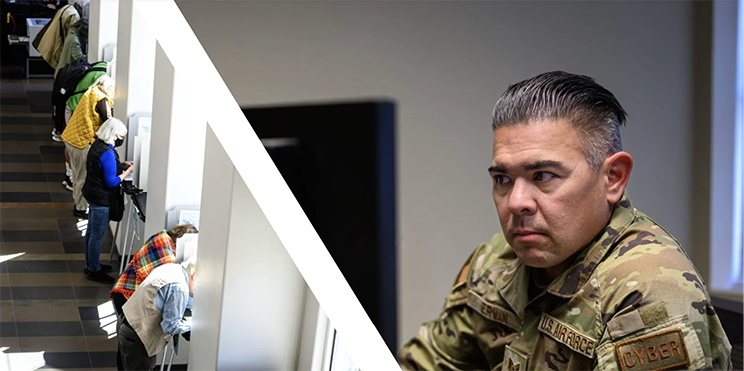How cyber soldiers at Kirtland Air Force Base safeguard the integrity of New Mexico’s vote10/31/2024 To prevent hackers, foreign enemies, and other bad guys from meddling with democracy, the New Mexico Secretary of State works with the Air National Guard in a complicated operation that keeps the process running smoothly on Election Day
by Michael Benanav Searchlight New Mexico On an afternoon in early October, inside a bland, beige office on Albuquerque’s Kirtland Air Force Base, two uniformed servicemen are sitting at desks, their eyes scanning computer monitors. Both are members of a team coordinated by the Cyber Unit of New Mexico’s Air National Guard that helps ensure New Mexico’s election security. At the moment, they’re engaged in what’s called “active threat hunting” — searching for signs that someone, somewhere, might be trying to break into any of the state’s systems related to voting. “We look for any malicious activity,” says Master Sergeant Ray Torres, a guardsman who works with the New Mexico Secretary of State’s office and the Department of Homeland Security to safeguard elections. While it’s impossible to hack into voting machines, which are “air-gapped” — meaning they’re never connected to the internet — voter registration rolls and other components of election infrastructure exist online. “We’ve had nation-states poking around in our websites and our online systems,” says Maggie Toulouse Oliver, New Mexico’s Secretary of State, whose office is responsible for running elections. The first time this occurred, as far as she’s aware, was in 2016. The country poking around? Russia. “No actual election outcomes were affected, but that raised huge concerns,” she says. “Our cybersecurity posture has improved dramatically since then.” Knowing this, foreign adversaries have attempted to meddle in American elections in recent years. And frequent and false claims by Donald Trump and others in the GOP that the 2020 presidential election was stolen have become a rallying cry for his supporters. Election officials know there’s an imperative to safeguard the integrity of the vote — and to counter widespread disinformation that amplifies lies about rigged voting results. “The military is nonpartisan,” Torres says. “We can’t show favoritism. We just make sure the election is fair.” Describing the threats his team looks out for, Torres explains that some hackers “just want to cause havoc. But some state actors might want to get a foothold in the network to see what they can find, and then use that information to possibly throw the result of an election.” Many bots, he says, are automatically blocked by software. “What we’re really looking for is a ‘zero-day exploit’ — something never before seen in the wild, a new vulnerability or strategy to get into the system.” New Mexico’s online systems haven’t always been this secure. “We’ve had nation-states poking around in our websites and our online systems,” says Maggie Toulouse Oliver, New Mexico’s secretary of state, whose office is responsible for running elections. The first time this occurred, as far as she’s aware, was in 2016. The country poking around? Russia. “No actual election outcomes were affected, but that raised huge concerns,” she says during an interview at her office in Santa Fe. “Our cybersecurity posture has improved dramatically since then.” The secretary’s office has its own election security program, which Toulouse Oliver describes as “the first line of defense.” Among its many activities: conducting post-election audits to verify that the vote count is 100 percent accurate; mandating the use of paper ballots; and certifying voting machines. Her office also works closely with an array of partners, including New Mexico’s Department of Information Technology, as well as federal agencies like the Department of Homeland Security, the FBI and the Department of Justice. According to Toulouse Oliver, most genuine risks to election integrity involve politically motivated efforts to disenfranchise voters or spread disinformation that influences how people vote. “It’s almost impossible to tamper with a voting machine that’s actively deployed in an election,” she says. On Election Day, paper ballots are scanned into air-gapped voting machines. When the polls close, the memory cards from those machines are uploaded to another air-gapped system before the results are entered into a system that’s connected to the internet — “So that we’re preserving the record,” Toulouse Oliver says. In addition to tallying the votes, the machines save a digitally scanned image of every ballot, just in case something were to happen to the paper originals. While statewide rules match the best practices recommended by the U.S. Election Election Assistance Commission, Santa Fe County takes it a step further. According to County Clerk Katharine E. Clark, officials use vote tabulators with GPS trackers so that they know if the tabulators have been moved to any place they’re not supposed to be. “We have redundancy built into the system,” Toulouse Oliver says. “A lot of people, if they were to say, this is what I think needs to happen in order to make elections more secure — all that stuff is actually already happening. It’s like, no, we already thought of this!”
0 Comments
Your comment will be posted after it is approved.
Leave a Reply. |
Submit your ideas for local feature articles
Profiles Gardening Recipes Observations Birding Essays Hiking AuthorsYou! Archives
October 2025
Categories
All
|

 RSS Feed
RSS Feed